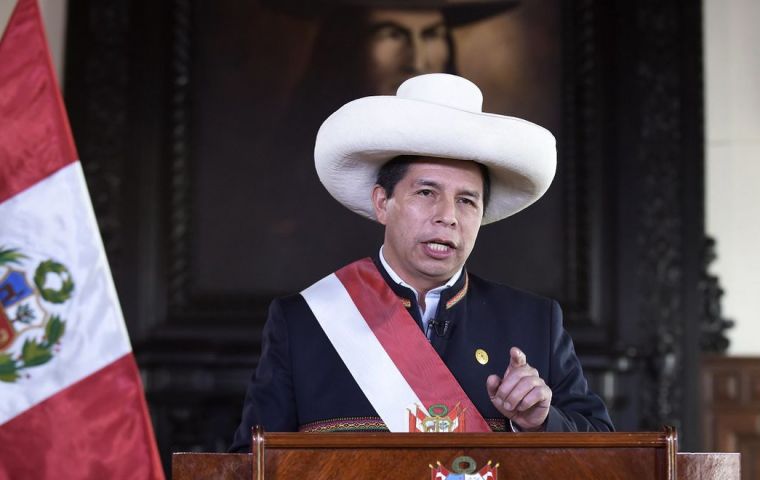MercoPress. South Atlantic News Agency
Peru's President seeks Congressional approval to travel to Bolivia
 Castillo took office in late July and is already at odds with most of Peru's political spectrum
Castillo took office in late July and is already at odds with most of Peru's political spectrum Just one day after Bolivia's ruling party Movement Towards Socialism was reported to have opened up an office in Peruvian territory, Peru's President Pedro Castillo Terrones has filed the customary petition before Congress to be allowed to travel to La Paz, Oct. 30 to participate in the “Presidential and VI Binational Ministerial Cabinet Bolivia - Peru Meeting.”
The document, signed by Prime Minister Mirtha Vásquez, points out that the event “constitutes the highest instance of dialogue and political coordination with Bolivia” and explains that discussions will focus on four thematic axes: environment and transboundary water resources; security and defense; economic development, social policies and institutional strengthening; and infrastructure for integration and development.
Strengthening ties between the two countries was already discussed during Castillo's inauguration on July 28 with Bolivian President Luis Arce. But other, less formal talks are also said to have taken place with former Bolivian leader Evo Morales.
Congress must discuss whether or not to grant the request for Castillo to leave the country. The President has already been allowed to travel to Mexico for a Celac Summit and also to New York for the United Nations' General Assembly.
In a scenario where an authorization for a head of state to leave the country on an official tour should be a mere formality but instead it makes the headlines, Castillo has sent key bills for Parliamentarian debate regarding the “question of confidence” and a Constitutional amendment for cases of presidential vacancy.
Castillo sees those two issues as of critical importance to guarantee governance at a time when he is at odds both with the opposition but also with the Peru Libre Party under which he sucessfully ran for the presidency.
The bills seek to remove moral incapacity as a cause for the removal from office of a president and also to regulate on the so-called question of trust towards members of the cabinet aas well as on the presidential vacancy.
The Castillo administration thus seeks to prevent changes proposed by the opposition on the same issued from being passed and which, according to Vásquez, “intend to regulate only part of the problem,” which would constitute “a great risk as it would generate a dangerous imbalance of powers.”
The ruling party and the allied blocs argue that “the appropriate mechanism to modify the content of the articles of the Constitution is through a constitutional reform law and not through a law,” in line with what the Castillo government proposes.
Under the current Constitution, Congress must ratify the government cabinet in session 30 days after taking office. If this does not occur after two attempts, the president is empowered - although not obliged - to resort to the question of confidence, dissolve Parliament and call for new elections.




Top Comments
Disclaimer & comment rulesCommenting for this story is now closed.
If you have a Facebook account, become a fan and comment on our Facebook Page!